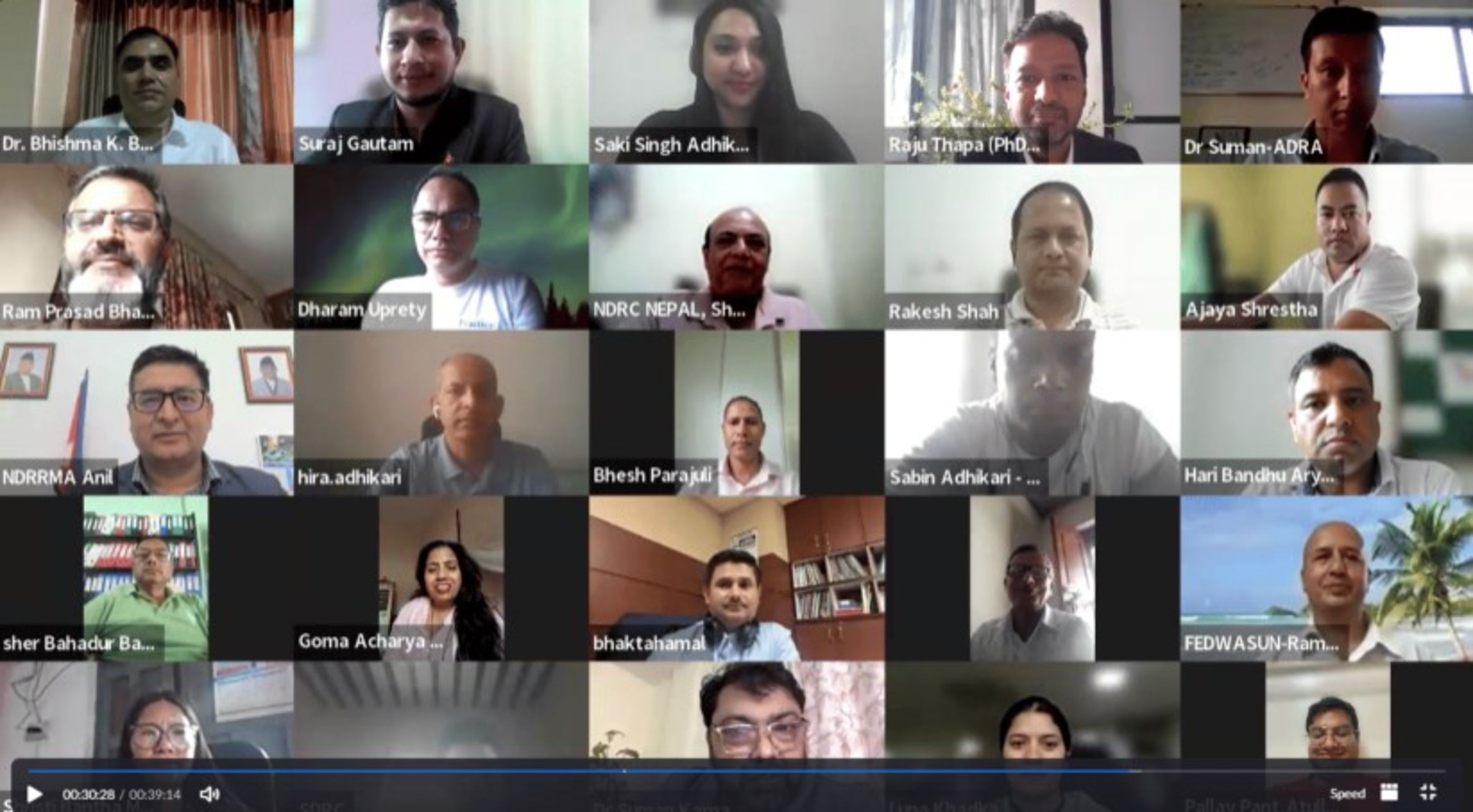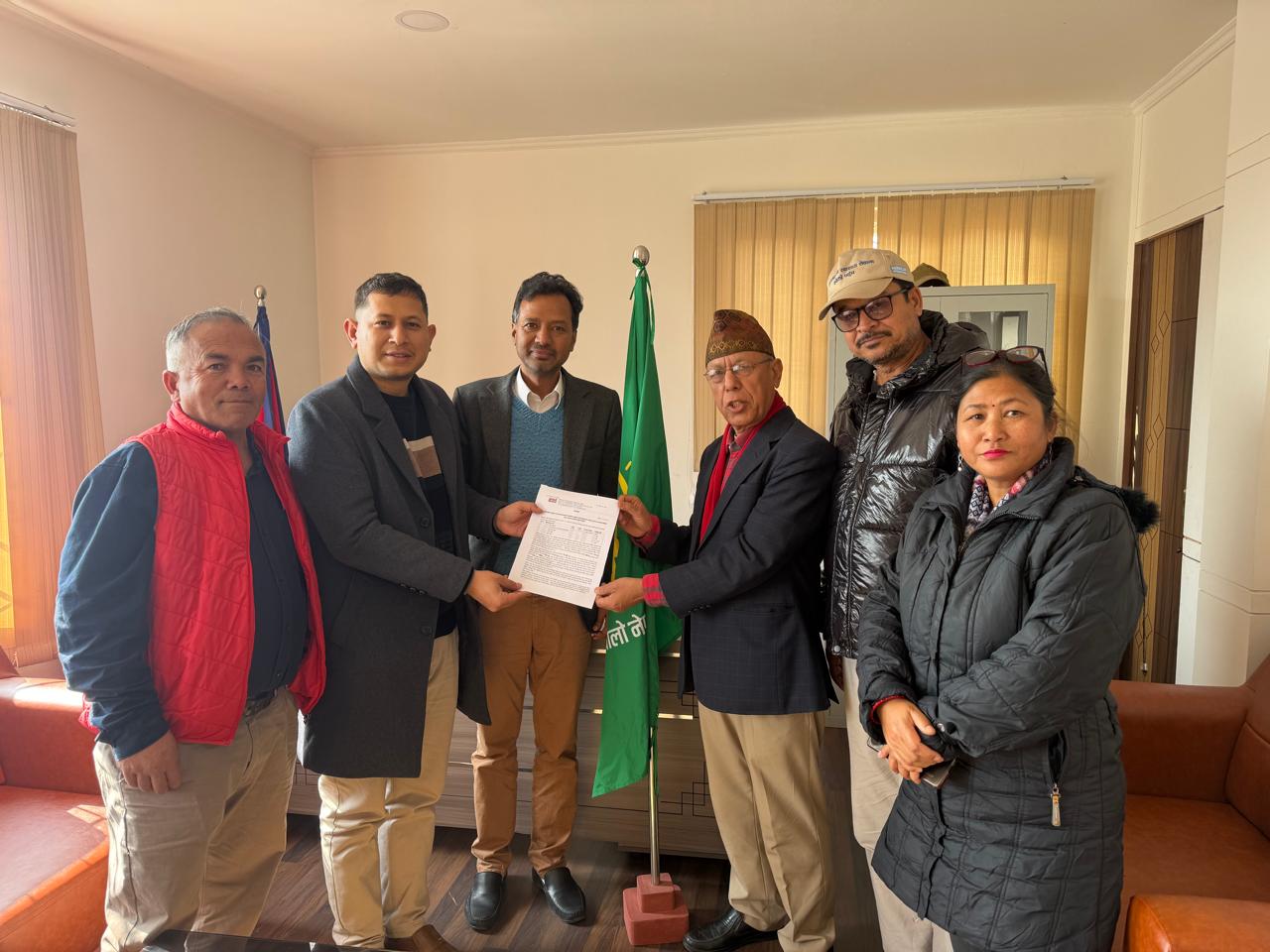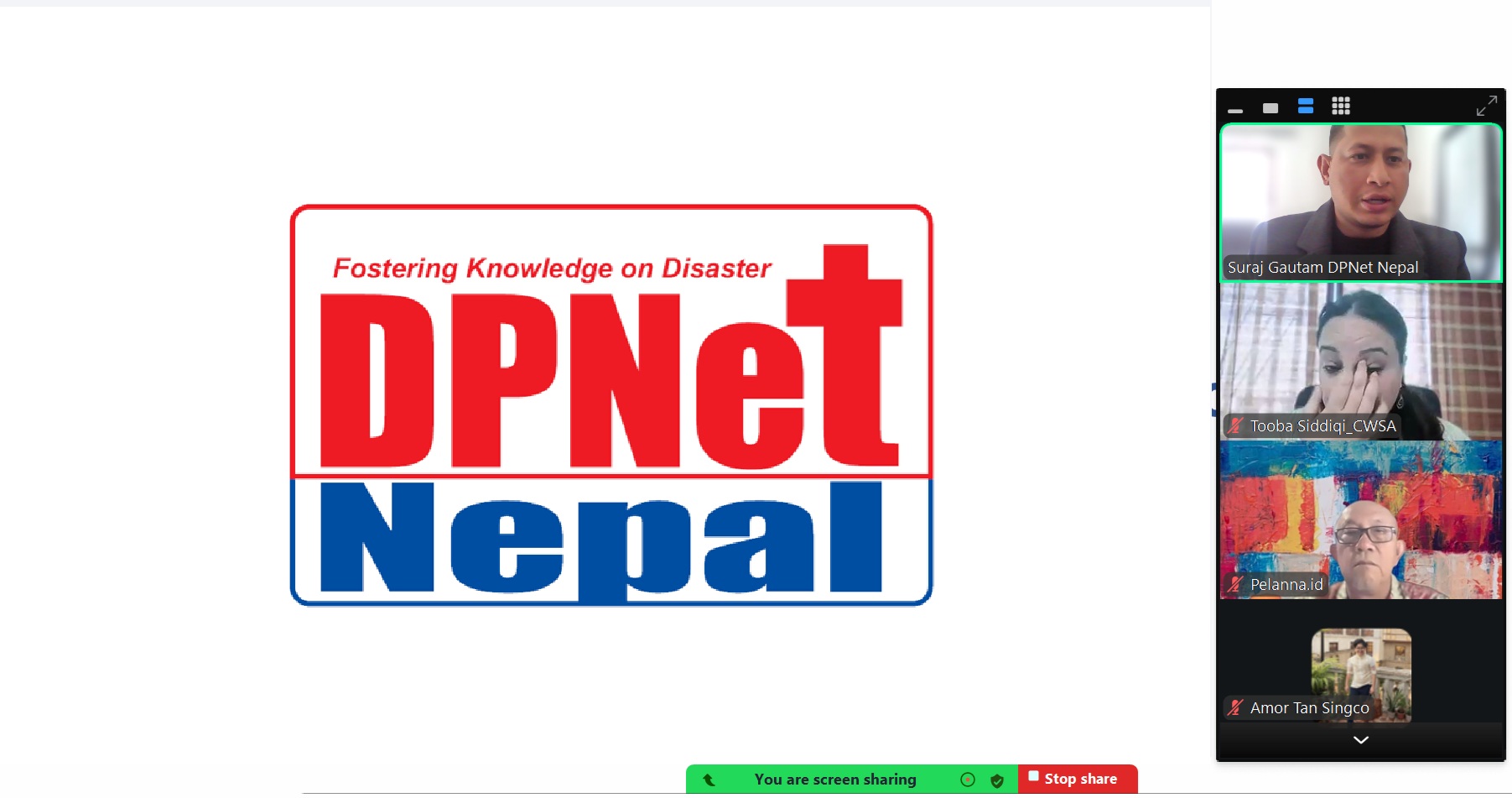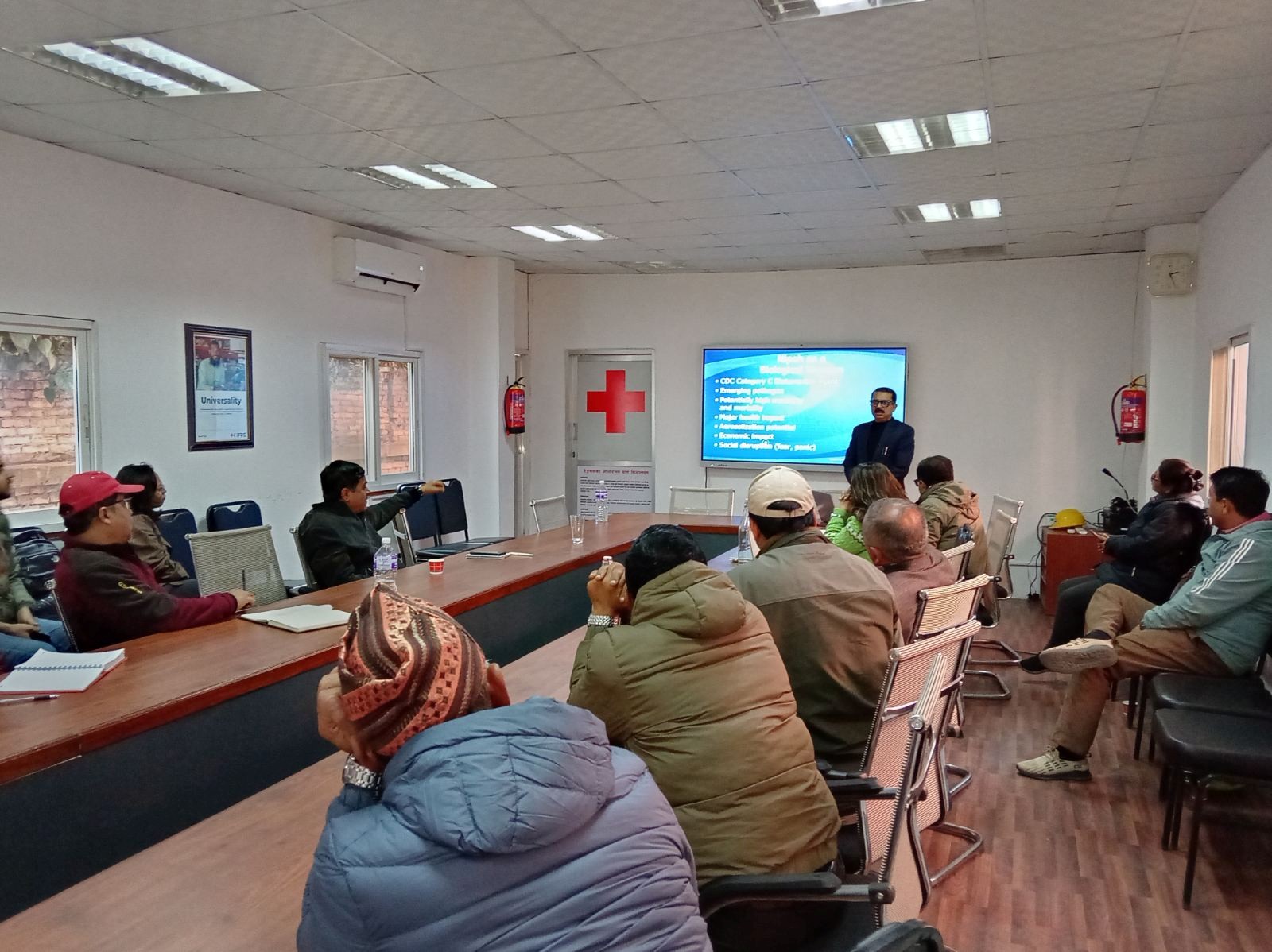APMCDRR Preparatory Meeting-2024

On July 2nd 2024, DPNet Nepal organized a virtual program for the APMCDRR Preparatory Meeting. The meeting was graced by the presence of Mr. Anil Pokhrel, Executive Chief of National Disaster Risk Reduction and Management Authority (NDRRMA), and Dr. Bhisma Kumar Bhusal, Chief of the Disaster Management Division, Ministry of Home Affairs (MoHA)a and was attended by various stakeholders and member organizations of DPNet with about 60 participants.
The program was facilitated by Mr. Suraj Gautam, General Secretary, DPNet. Mr. Gautam welcomed the guests Dr. Bhishma K Bhusal, Chief of the Disaster Management Division, MoHA, Mr. Anil Pokhrel, Executive Chief, NDRRMA, and all the virtual participants joining the Preparatory Meeting. Mr. Gautam also highlighted the role of DPNet as a secretariat to the National Platform for Disaster Risk Reduction (NPDRR) and also iterated the fact that the APMCDRR is just 103 days away from today. Similarly, Mr. Gautam highlighted the objective of the program to update the preparatory activities and prioritize the remaining preparatory works.
Dr. Raju Thapa, Chairperson, DPNet Nepal, provided a brief introduction highlighting the significance of APMCDRR 2024. Dr. Thapa outlined the primary objectives and goals of the preparatory meeting, which included setting the stage for the upcoming conference, identifying key areas of focus and priority actions, and fostering stakeholder engagement and collaboration. A comprehensive presentation covered the agenda for APMCDRR 2024, expected outcomes, and the roadmap to achieving the goals by 2030. The presentation highlighted the importance of collective efforts and innovative approaches to disaster risk reduction (DRR) in the region. Dr Thapa shared that APMCDRR occurs every two years and previously known as AMCDRR, the name was changed to APMCDRR in 2022 as Australia was included. In 2023, a midterm review of the Sendai Framework was conducted, and this year's objective is to address the remaining goals needed to fulfill the Sendai Framework. The introductory meeting for APMCDRR 2024, themed "Eyes on 2030: Enhancing Ambition in Asia-Pacific," provided an overview scheduled for October 14-17, 2024, in Manila. The conference focused on practical solutions to enhance disaster risk financing, gender-responsive and inclusive disaster risk governance, and localization and resilience in urban and rural areas. Key areas of focus included sustainable investments in DRR, the role of technology and knowledge, and multi-stakeholder collaboration. The cross-cutting themes emphasized the integration of science and technology, convergence across DRR, climate, and development, and private sector engagement. Dr. Thapa also discussed the challenges and opportunities in DRR, aiming to enhance resilience and sustainable development in the Asia-Pacific region. He stated that Nepal's participation in APMCDRR, under NPDRR and coordinated by DPNet, involved developing a common position paper, raising funds through a basket fund, and ensuring visibility for all contributors. Planned activities included attending main and parallel sessions, participating in sideline events, and managing the marketplace. He added that preparatory efforts involved organizing a basket fund, creating an official statement and position paper, producing a short video, and holding coordination and pre-departure meetings among prospective participants.
Discussion Session
In the discussion session, participants raised various issues concerning the preparation of the position paper and the registration process for the upcoming APMCDRR conference. They inquired about the number of people who had already registered and those who had yet to do so, emphasizing the need for discussions after receiving registration confirmations to determine the number of participants and the extent of preparation required. This highlights the necessity for organized planning and effective communication among all stakeholders to ensure a well-coordinated presence at the conference. Concerns were also raised regarding whether organizations should register individually or as groups, and it was clarified that registration should be done individually. Additionally, questions about the organization of the next preparatory meeting were addressed, with the response indicating that it would be conducted within a loose network. This part of the discussion highlights the need for clear guidelines and efficient coordination in the preparatory activities, ensuring that all participants are well-prepared and aligned with the collective goals for APMCDRR 2024. The emphasis on individual registration and networked planning reflects a strategic approach to fostering collaboration and comprehensive engagement among the various stakeholders involved.
Registration Link:
https://apmcdrr.undrr.org/2024/register-apmcdrr
Remarks
Dr. Bhishma K Bhusal, Chief of the Disaster Management Division, MoHA, thanked all the participants and emphasized that lessons learned from past hazards are often forgotten. Dr. Bhusal highlighted the strong sense of volunteering among Nepalese, which can be showcased at the conference. He also suggested demonstrating the functionality of the Bipad portal, which facilitates inter-organizational collaboration in DRR. He requested development partner to strengthen the capacity of NDRRMA. He identified a gap where efforts often focused on individual benefits and easy tasks, stressing the need for better coordination and consideration of national priorities in DRR activities. The Jajarkot earthquake illustrated the gap in learning from past disasters. He observed a lack of coordination between the government and NGOs/INGOs in his recent observation and stressed the importance of working together for a better future.
Mr. Anil Pokhrel, Executive Chief, NDRRMA, acknowledged Dr. Raju Thapa's vital role in last year's APMCDRR, thanking him for his hard work and effective coordination of the 2023 conference preparations. He noted Dr. Bhusal's experience in the field of DRR and emphasized the need to create a task force and a WhatsApp group for APMCDRR 2024 similar to last year, for better coordination as early as possible. He mentioned that Ms. Smita from NDRRMA who look after NPDRR would assist in the process. He highlighted the necessity of collectively preparing for this year's theme and determining what works related to risk financing, multi-hazard risk assessment, and early warning systems in Nepal could be showcased. He emphasized discrete actions and clear roles and responsibilities. Continuous update reporting was recommended to ensure thorough preparation. Mr. Pokhrel expressed confidence that, with the experience gained from last year, better results could be achieved. He concluded the program by stressing the importance of discussing and preparing the program highlights and showcasing the work done by NPDRR and the BIPAD portal, emphasizing collective effort for success.
On July 2nd 2024, DPNet Nepal organized a virtual program for the APMCDRR Preparatory Meeting. The meeting was graced by the presence of Mr. Anil Pokhrel, Executive Chief of National Disaster Risk Reduction and Management Authority (NDRRMA), and Dr. Bhisma Kumar Bhusal, Chief of the Disaster Management Division, Ministry of Home Affairs (MoHA)a and was attended by various stakeholders and member organizations of DPNet with about 60 participants.
The program was facilitated by Mr. Suraj Gautam, General Secretary, DPNet. Mr. Gautam welcomed the guests Dr. Bhishma K Bhusal, Chief of the Disaster Management Division, MoHA, Mr. Anil Pokhrel, Executive Chief, NDRRMA, and all the virtual participants joining the Preparatory Meeting. Mr. Gautam also highlighted the role of DPNet as a secretariat to the National Platform for Disaster Risk Reduction (NPDRR) and also iterated the fact that the APMCDRR is just 103 days away from today. Similarly, Mr. Gautam highlighted the objective of the program to update the preparatory activities and prioritize the remaining preparatory works.
Dr. Raju Thapa, Chairperson, DPNet Nepal, provided a brief introduction highlighting the significance of APMCDRR 2024. Dr. Thapa outlined the primary objectives and goals of the preparatory meeting, which included setting the stage for the upcoming conference, identifying key areas of focus and priority actions, and fostering stakeholder engagement and collaboration. A comprehensive presentation covered the agenda for APMCDRR 2024, expected outcomes, and the roadmap to achieving the goals by 2030. The presentation highlighted the importance of collective efforts and innovative approaches to disaster risk reduction (DRR) in the region. Dr Thapa shared that APMCDRR occurs every two years and previously known as AMCDRR, the name was changed to APMCDRR in 2022 as Australia was included. In 2023, a midterm review of the Sendai Framework was conducted, and this year's objective is to address the remaining goals needed to fulfill the Sendai Framework. The introductory meeting for APMCDRR 2024, themed "Eyes on 2030: Enhancing Ambition in Asia-Pacific," provided an overview scheduled for October 14-17, 2024, in Manila. The conference focused on practical solutions to enhance disaster risk financing, gender-responsive and inclusive disaster risk governance, and localization and resilience in urban and rural areas. Key areas of focus included sustainable investments in DRR, the role of technology and knowledge, and multi-stakeholder collaboration. The cross-cutting themes emphasized the integration of science and technology, convergence across DRR, climate, and development, and private sector engagement. Dr. Thapa also discussed the challenges and opportunities in DRR, aiming to enhance resilience and sustainable development in the Asia-Pacific region. He stated that Nepal's participation in APMCDRR, under NPDRR and coordinated by DPNet, involved developing a common position paper, raising funds through a basket fund, and ensuring visibility for all contributors. Planned activities included attending main and parallel sessions, participating in sideline events, and managing the marketplace. He added that preparatory efforts involved organizing a basket fund, creating an official statement and position paper, producing a short video, and holding coordination and pre-departure meetings among prospective participants.
Discussion Session
In the discussion session, participants raised various issues concerning the preparation of the position paper and the registration process for the upcoming APMCDRR conference. They inquired about the number of people who had already registered and those who had yet to do so, emphasizing the need for discussions after receiving registration confirmations to determine the number of participants and the extent of preparation required. This highlights the necessity for organized planning and effective communication among all stakeholders to ensure a well-coordinated presence at the conference. Concerns were also raised regarding whether organizations should register individually or as groups, and it was clarified that registration should be done individually. Additionally, questions about the organization of the next preparatory meeting were addressed, with the response indicating that it would be conducted within a loose network. This part of the discussion highlights the need for clear guidelines and efficient coordination in the preparatory activities, ensuring that all participants are well-prepared and aligned with the collective goals for APMCDRR 2024. The emphasis on individual registration and networked planning reflects a strategic approach to fostering collaboration and comprehensive engagement among the various stakeholders involved.
Registration Link:
https://apmcdrr.undrr.org/2024/register-apmcdrr
Remarks
Dr. Bhishma K Bhusal, Chief of the Disaster Management Division, MoHA, thanked all the participants and emphasized that lessons learned from past hazards are often forgotten. Dr. Bhusal highlighted the strong sense of volunteering among Nepalese, which can be showcased at the conference. He also suggested demonstrating the functionality of the Bipad portal, which facilitates inter-organizational collaboration in DRR. He requested development partner to strengthen the capacity of NDRRMA. He identified a gap where efforts often focused on individual benefits and easy tasks, stressing the need for better coordination and consideration of national priorities in DRR activities. The Jajarkot earthquake illustrated the gap in learning from past disasters. He observed a lack of coordination between the government and NGOs/INGOs in his recent observation and stressed the importance of working together for a better future.
Mr. Anil Pokhrel, Executive Chief, NDRRMA, acknowledged Dr. Raju Thapa's vital role in last year's APMCDRR, thanking him for his hard work and effective coordination of the 2023 conference preparations. He noted Dr. Bhusal's experience in the field of DRR and emphasized the need to create a task force and a WhatsApp group for APMCDRR 2024 similar to last year, for better coordination as early as possible. He mentioned that Ms. Smita from NDRRMA who look after NPDRR would assist in the process. He highlighted the necessity of collectively preparing for this year's theme and determining what works related to risk financing, multi-hazard risk assessment, and early warning systems in Nepal could be showcased. He emphasized discrete actions and clear roles and responsibilities. Continuous update reporting was recommended to ensure thorough preparation. Mr. Pokhrel expressed confidence that, with the experience gained from last year, better results could be achieved. He concluded the program by stressing the importance of discussing and preparing the program highlights and showcasing the work done by NPDRR and the BIPAD portal, emphasizing collective effort for success.











